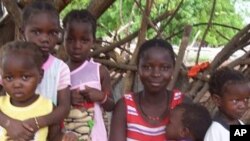Normally men raise the sheep that will be sold at the annual Muslim holiday feast, known as Tabaski in West Africa. But an enterprising group of women are now selling the animals.
As Muslims prepare for the annual feast of Eid al-Adha, also known as Tabaski in West Africa, traditionally it is the men who raise and sell the sheep that will be sacrificed at the feast. But one group of women in Southeastern Senegal have spent the past months working on what they have named, Operation Tabaski.
In July a group of 70 women in the Tambacounda region of Senegal pooled their money together and crossed the border into Mali to buy 25 sheep. The group is known as Ande Bokke Leggay, which means "To Work Together" in the Senegalese language of Wolof. Their secretary general, Madam Oumi Sy, says the group has been developing economic projects for women since 1996, but this was the first year the group raised and fattened to sheep to sell for the Tabaski holiday.
She adds the main goal is that they can pay the school fees for their children, and help other low-income women in the region do the same.
They originally bought the sheep for around $35 each. They are now selling their largest ones for around $165. It has been successful this year, so they will continue the project next year, says the group's project coordinator, Khadiatou Sy.
She says this project is a battle against the current financial crisis, because many women in the region do not have enough money right now.
A U.S. Peace Corps Volunteer in Tambacounda, Jessica Young, says the group of women have shown a lot of dedication to improving business practices during Operation Tabaski.
"They work day in day out, within their families, but also on site, income generating activities, so they definitely have the will," said Young.
Tabaski will be celebrated November 28th this year in Senegal. Muslims celebrate the holiday to commemorate when God asked Abraham to sacrifice his son. To honor this, Muslim families in Senegal sacrifice a sheep.
News
Women Fatten Sheep to Raise Money for School Fees
update

A group of women in Southeastern Senegal pooled their money, bought 25 sheep for $35 each, now selling their largest ones for around $165, in their latest business project, called Operation Tabaski





